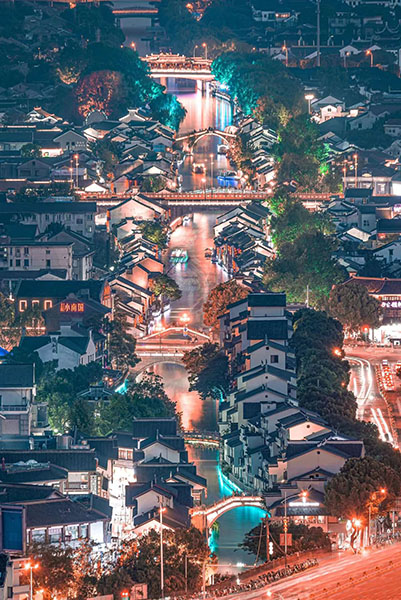

Wuxi, the sole city where the Beijing-Hangzhou Grand Canal flows through, stands as a testament to the intersection of ancient charm and modern vitality. Renowned for its picturesque Jiangnan landscape featuring small bridges, flowing waterways, and riverside homes, Wuxi also holds the distinction of being a cradle of modern Chinese industry and commerce, drawing both locals and tourists alike.
The Qingming Bridge, located in Wuxi's Liangxi district, serves as a captivating intersection where the ancient Grand Canal converges with Bodu port. Here, visitors encounter a meticulously preserved area where historic houses, shops, and the former residences of illustrious figures harmoniously coexist, creating a vibrant living museum that embodies the rich history and culture of the Grand Canal.
According to Yang Jianmin, secretary-general of the Wuxi Cultural Heritage Conservation Foundation, the ancient Grand Canal in Wuxi is deeply interwoven into the city's fabric, evoking strong sentiments among its people. Yang emphasized the organic grassroots efforts of citizens, coupled with early government initiatives, in designating the canal as a protected treasure, underscoring the profound local commitment to preservation.

In recent years, Wuxi has revitalized its neighborhoods by safeguarding and restoring cultural relics, historical edifices, and traditional architectural elements, seamlessly integrating preservation imperatives with contemporary development needs.
Notably, the Wuxi kiln site museum along the ancient Grand Canal offers visitors a glimpse into China's brickmaking culture spanning over 600 years, providing an immersive experience that resonates with the area's rich historical legacy.
The descendants of canal workers, deeply rooted in the Qingming Bridge area, continue to play an integral role in preserving their heritage, contributing not only historical artifacts but also cherished bricks and tiles passed down through generations, underscoring the enduring bond between the community and its storied past.
Wuxi's transformation of the historic Maoxin Flour Mill into the Wuxi Chinese Ethnic Industrial and Commercial Museum further underscores the city's commitment to preserving its industrial heritage, offering visitors a captivating journey through the region's industries and their historical significance.
Looking ahead, Wuxi aims to leverage the UNESCO World Heritage designation of the Grand Canal, envisioning the ancient waterway as a global tourist destination. This vision includes the development of unique dining experiences, inviting accommodations, and engaging activities, providing visitors with an opportunity not only to traverse the ancient canal but also to immerse themselves in its timeless allure and vibrant ambiance.